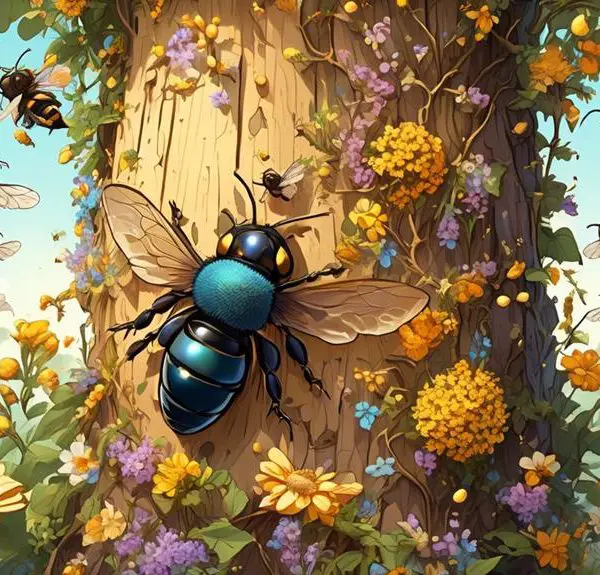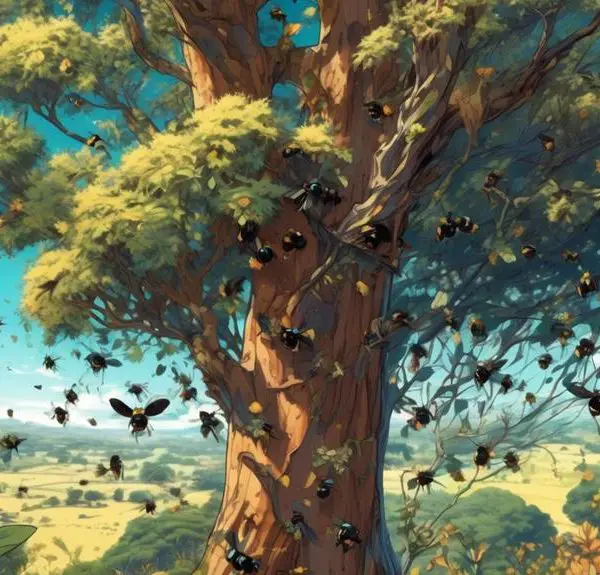Take a journey into the green valleys of Portugal, where the unique Carpenter Bee plays a vital, yet unsuspected, role in the ecosystem.
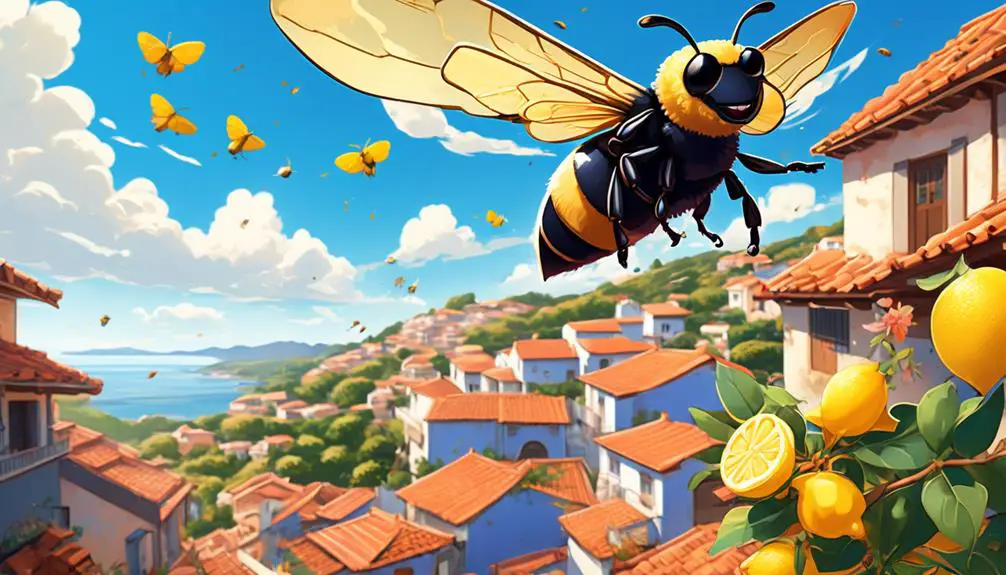
Carpenter Bee Portugal
Imagine the sunlit, verdant valleys of Portugal, where the hum of bees is as much a part of the landscape as the olive groves and ripening vineyards.
Among these bees, you'll find the industrious Carpenter Bee, recognized by its robust, black body and gleaming wings.
Now, you might think you know bees, but Carpenter Bees have a distinctive lifestyle that sets them apart from their honey-making cousins. They're solitary creatures, preferring to carve out their homes in the soft wood of dead trees.
But why, you might ask, should we concern ourselves with this particular species? Well, there's more to these fascinating creatures than meets the eye, and their role in Portugal's ecosystem might just surprise you.
Key Takeaways
- Carpenter bees are solitary creatures that build their nests in dead wood or bamboo stems.
- They are efficient pollinators, aiding in the reproduction of numerous plant species through their feeding habits.
- Carpenter bees are most common in rural areas with plenty of wood for nesting, but changes in climate patterns could potentially affect their distribution.
- Deforestation, urbanization, and pesticide usage are major threats to carpenter bees, but there are conservation efforts in Portugal to protect their habitats and limit pesticide use.
Understanding Carpenter Bees
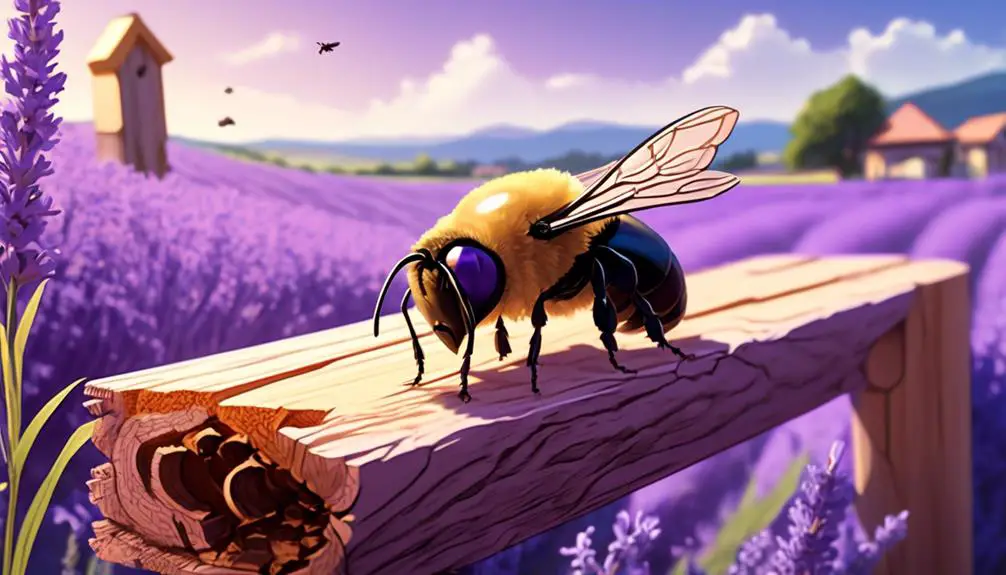
To fully comprehend the intricacies of carpenter bees, particularly those found in Portugal, you must delve into their unique biology, behavior, and role in the ecosystem.
Unlike their notorious relatives – the honey bees and bumblebees, carpenter bees are solitary creatures. Each female independently builds her nest, usually in dead wood or bamboo stems, hence their name. They're equipped with strong jaws, capable of chewing through wood, creating intricate tunnels for their brood.
You'll find carpenter bees' biology fascinating. Notably, they're sexually dimorphic, meaning males and females exhibit different characteristics. Females are usually larger and completely black, while males show more color variations, typically with a yellow face. This difference in appearance is accompanied by varying roles. Males, despite their imposing appearance, can't sting. Their role is primarily to mate and guard the nest.
The importance of these bees within Portugal's ecosystem shouldn't be underestimated. As efficient pollinators, they play a critical part in maintaining biodiversity. They're attracted to open-faced flowers, transferring pollen as they feed, thus aiding in the reproduction of numerous plant species. So, while they may be less social, their contributions to the ecosystem are no less significant.
Habitat and Distribution in Portugal

While appreciating their significant role in the ecosystem, it's also crucial to understand the habitat and distribution of carpenter bees in Portugal. As a lover of warmer climates, the carpenter bee thrives in Portugal's Mediterranean climate, often building nests in dead wood or bamboo.
The distribution of carpenter bees in Portugal is widespread, but they're most common in rural areas where they can find plenty of wood for nesting. Here's a simple table to illustrate their habitat and distribution:
Habitat | Distribution |
|---|---|
Dead wood | Widespread |
Bamboo | Rural areas |
Softwood | Less common |
In the scientific community, it's understood that changes in climate patterns could potentially affect their distribution. As a result, continuous monitoring and research are necessary to understand the full impact of these changes on carpenter bees and, subsequently, on Portugal's ecosystem. This knowledge will not only support the conservation of these fascinating creatures but will also contribute to maintaining the balance within the ecosystem.
Role in Portuguese Ecosystem

Diving into the Portuguese ecosystem, you'll find that carpenter bees play an indispensable role in pollination, thereby maintaining biodiversity and contributing to the health of the environment. These bees are essential pollinators, transferring pollen from the male parts of a flower to the female parts, thus facilitating fertilization and plant reproduction.
Carpenter bees' distinctive foraging habits involve 'buzz pollination', a unique strategy where they vibrate their bodies at a specific frequency to dislodge pollen from flowers. This technique is particularly beneficial to plants with 'poricidal' flowers, where pollen is released through tiny pores, a feature common in certain plant species native to Portugal.
Moreover, carpenter bees' role isn't limited to pollination. Their nesting habits, which involve burrowing into wood, create habitats for other species like beetles and fungi, thereby increasing ecosystem diversity. They're also an important food source for various bird and insect predators.
Threats and Conservation Efforts
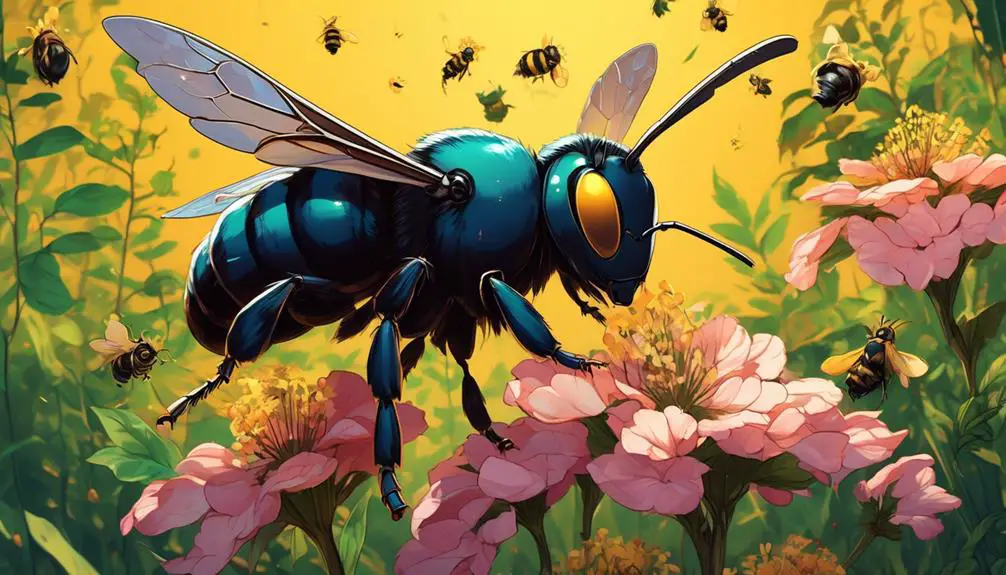
Despite their vital role in maintaining biodiversity, carpenter bees face numerous threats, necessitating concerted conservation efforts.
You should know that their habitats are shrinking due to rampant deforestation and urbanization. Pesticide usage, particularly neonicotinoids, is another major threat, leading to severe population declines.
Now, let's delve into the conservation efforts. Portugal has been actively advocating for a pan-European ban on harmful pesticides. You've seen the results; in 2018, the European Union voted to ban outdoor use of three neonicotinoids. This represents a significant victory for pollinators like the carpenter bee.
Local conservation efforts, however, shouldn't be overlooked. You can participate in citizen science projects, like the 'Bee Friendly' initiative, which encourages planting bee-friendly flora. You can also limit your use of pesticides in home gardens.
In the scientific realm, research is ongoing to better understand carpenter bees, their needs, and threats. The data gathered is instrumental in informing policy and management decisions.
Preserving the carpenter bee population isn't just an ecological imperative; it's also crucial for Portugal's agricultural sector. Remember, every action counts in this collective endeavor.
Interesting Facts About Carpenter Bees
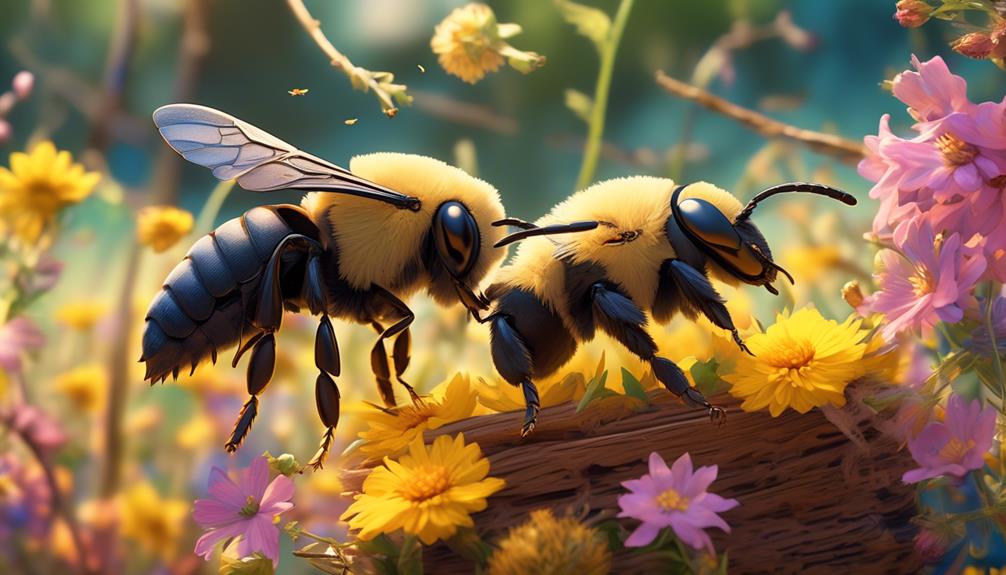
Often overlooked, the carpenter bee holds a treasure trove of fascinating facts that you're about to uncover. Unlike honeybees, they're solitary creatures. Each female excavates her own nest, typically in wood, hence their name. They don't eat the wood, instead, they discard it or use it to build partitions within their nests.
Carpenter bees are key pollinators, playing a crucial role in maintaining biodiversity. Their unique method of 'buzz pollination' shakes pollen loose, making them effective pollinators for certain types of plants, including tomatoes and eggplants.
Interestingly, male carpenter bees can't sting, which is unusual in the bee world. Only females have this ability, but they're generally docile and sting only when handled or threatened.
Moreover, these bees have a long lifespan compared to other bees, often living up to one year. This longevity is, in part, due to their unique nesting habits, which provide a secure and sheltered environment.
You can identify carpenter bees by their shiny, black abdomen, which is unlike the hairy abdomen of bumblebees. They're mostly found in the warmer regions of Portugal, but can adapt to various climates, making them a resilient species.
Conclusion
In Portugal, Carpenter bees are more than just another insect. They contribute significantly to the ecosystem by pollinating plants. You've seen how crucial they are. However, they face threats that jeopardize their existence. Conservation efforts are vital to protect these fascinating insects. Carpenter bees are an integral part of Portugal's biodiversity.
Remember, they are more than their intimidating appearance.

